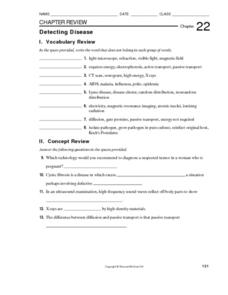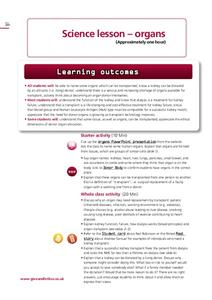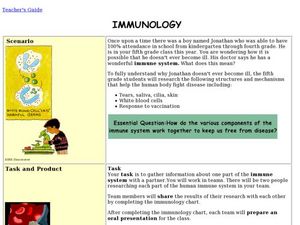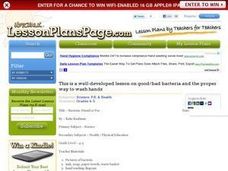Curated OER
Detecting Disease
In this detecting disease worksheet, students will review the different tools scientists use to identify diseases including the steps of Koch's postulates. This worksheet has 14 fill in the blank and 4 short answer questions.
Curated OER
Guidelines for Sexual Health Information and Disease Prevention
Students describe effective sex education and its outcomes. They provide a tool for educators, policy-makers and others to evaluate existing or new programs, curricula or policies. Students comprehend that sex education refers both to...
Curated OER
Preventing and Treating Disease
In this disease learning exercise, students will review the organs associated with the immune system including their specific functions. This learning exercise has 10 matching, 8 true or false, and 5 short answer questions.
Howard Hughes Medical Institute
A Lesson on the Nature of Science
If you are looking for a great way to present natural selection in humans, look no further. This handout is intended to accompany the 14-minute video The Making of the Fittest: Natural Selection in Humans, which can be found on the...
Curated OER
Pandemics and Epidemics
Students evaluate data related to population growth, along with problems and soultions: disease cvontrol. They are able to explain how changes in habitat may affect organisms. Students evaluate evolutionary theories and processes.
Curated OER
Social Studies: Factors Involved in the Spread of Disease
Students examine the reasons diseases become epidemics. they analyze the social, political, and economics factors involved in the process. Students complete charts explaining how these factors aid the spread of disease and discuss...
Curated OER
Life Processes and Living Things-Humans and Other Animals
In this fill in the blank worksheet, students respond to 20 short answer questions by identifying foods that contain large amounts of sugar, carbohydrate, and fruit acids and explaining their effects on the body.
Curated OER
Pooper Scooper
Science Students build a pooper scooper tool that helps them clean up after a dog without getting their hands dirty or their noses too close. They research the diseases that can be transported through animal waste and work in teams to...
Curated OER
What's Really True? Discovering the Fact and Fiction of Autism
Youngsters investigate autism and autism spectrum disorders. They access a variety of websites which present information on ASD's, and assess how accurate the information they've read actually is. They work in groups and utilize...
Curated OER
Infectious Diseases
Seventh graders create a brochure for a fictional pharmaceutical company.
Personal Genetics Education Project
Genetics and Reproduction
Disease prevention or designer babies? Use a set of slides to introduce the growing practice of preimplantation genetic diagnosis, or PGD. Teens read related articles and then break into groups to address different scenarios. Afterward,...
Nemours KidsHealth
Stress: Grades 9-12
Everyone feels stress from time to time, but how can you move past it? A seven-page packet of activities guides high schoolers through the process of recognizing and managing their stress. The resource includes discussion topics, a...
Curated OER
Gene Regulation Mechanisms
Young scholars explore the control of expression of DNA into proteins which is divided into two main categories: transcriptional and post-transcriptional. They construct examples of the control mechanisms and discuss disease processes...
Give and Let Live
Blood and Transplant: Organs
Who donates organs, and how do organ donations work? The third lesson in a four-part series discusses the tremendous need for donor organs of all ages and backgrounds. A variety of materials, included with the teacher's guide, walk...
Howard Hughes Medical Institute
Cells of the Immune System
You won't be able to resist the content of a great presentation! Young immunologists discover the variety of cells involved in keeping our bodies free from pathogens with a resource that contains both slides and video clips. The included...
Curated OER
Immunology
Students investigate the immune system. In this immune system lesson, students explore the immune system through participating in a WebQuest. After completing the WebQuest, students create a video documentary or chart.
Curated OER
Government Policy and Its Impact on HIV/AIDS
High schoolers examine "President Bush's Emergency Plan for AIDS Relief", identify important U.S. policy events related to AIDS/HIV from the last 25 years and hold a policy debate on the funding for AIDS/HIV programs.
Curated OER
Pandemic Flu
Students review the difference between viruses and bacteria, and provide examples of illnesses that each can cause. To help students comprehend how quickly an influenza infection can spread, they perform an activity. They are placed in...
Curated OER
Immune System: The Master of Self-Defense
Students examine the role of the immune system in the human body. They conduct a hand-washing experiment, answer questions while viewing videos, discuss key vocabulary, draw and label illustrations, and observe demonstrations and record...
Curated OER
Bacteria: Friend or Foe?
Students examine a variety of environmental and industrial roles of bacteria. explore where bacteria can be found and distinguish bacteria from other organisms.
Curated OER
Taiping Rebellion
Young scholars reflect on the impact of the Taiping Rebellion. In this World History lesson, students work in small groups to research and discuss the Taiping Rebellion and the ramifications it had around the world, then share...
Curated OER
AP: Chapter 17: From Gene to Protein
Biology learners describe the metabolic pathways and the transcription and translation of genetic information. They will party on the last page as they trace the flow of information through a large and colorful diagram.
Teach Engineering
Curb the Epidemic!
Class members use an applet on the Internet to simulate the spread of a disease. The simulation allows individuals to determine two nodes to vaccinate to limit the number of nodes infected. By running several simulations, scholars...
National Center for Case Study Teaching in Science
In Sickness and in Health
Based on family history, how likely is it that a couple's children will have a recessive disease? In an in-depth, but easy-to-follow case study, future geneticists learn the story of Greg and Olga, who are hoping to have children, but...























